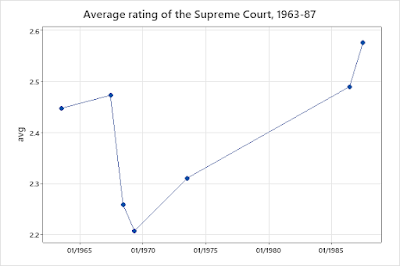Since the Dobbs decision, I have seen many claims that it has (or will) cause the Supreme Court to lose legitimacy (here is one example). It does appear that most people did not want the court to overturn Roe v. Wade, but this is not the first unpopular decision (and almost certainly not the most unpopular). That raises the question of why this particular decision should have a lasting effect. It seems like a reasonable model to start with would be that decisions affect views of the court based on a combination of popularity and prominence, but that the impact declines over time as memories fade and people get used to the new situation (which is almost never as bad as critics of the decision predicted it would be). On the other hand, there may be some decisions that have a lasting impact, maybe because they have unexpected consequences that keep them in the news (for example, if state differences in laws on abortion lead to disputes between states that produce more cases for the Court) or just because they seem so unfair to a substantial part of the public (the case that decided the 2000 election might be an example).
According to the Gallup Poll, confidence in the Supreme Court has generally declined since the 1970s--see this post and the latest update from Gallup. But there has been a decline in confidence in many institutions, so it's hard to say what part of that is unique to the Supreme Court. So I looked for data going farther back, and found one from Gallup that was asked six times from 1963 to 1987: "In general, what kind of a rating would you give the Supreme Court: excellent, good, fair, or poor." You could say that "confidence" gets at something deeper than "rating," but I think that most people don't make much distinction, so that they are reasonably good substitutes. What makes this question useful, aside from the general benefit of extending the period for which data are available, is that there were a lot of important decisions in the 1960s.
The average rating was lower in the middle (1968, 1969, and 1973) and then bounced back. An interesting point is that there was less dispersion in 1986 and 1987 than there had been in 1963 and 1967--fewer "excellents" and fewer "poors". There was a sharp decline in average confidence between June 1967 and June 1968. In my next post, I will try to find evidence, or at least hints, about what might have caused that.
[Data from the Roper Center for Public Opinion Research]

David. Great post and thanks for the data insights! My personal opinion is that the government as a whole is losing legitimacy as it seems that fewer decisions and laws are made with the working class in mind. Maybe Jurgen Habermas was correct in his assertion of a legitimation crisis. Thanks for the post.
ReplyDeleteAs I remember the time, the high marks early in the 60's represent generally liberal approval of the Warren court decisions, while the drop in the 70's was essentially blaming the court for being too liberal, contributing to riots and crime, pushing busing, criminal rights (Miranda), etc. That likely contributed to more dispersion of opinions. By the mid-80s with all of Nixon's appointees there was less passion about the court, particularly on the conservative side.
ReplyDelete